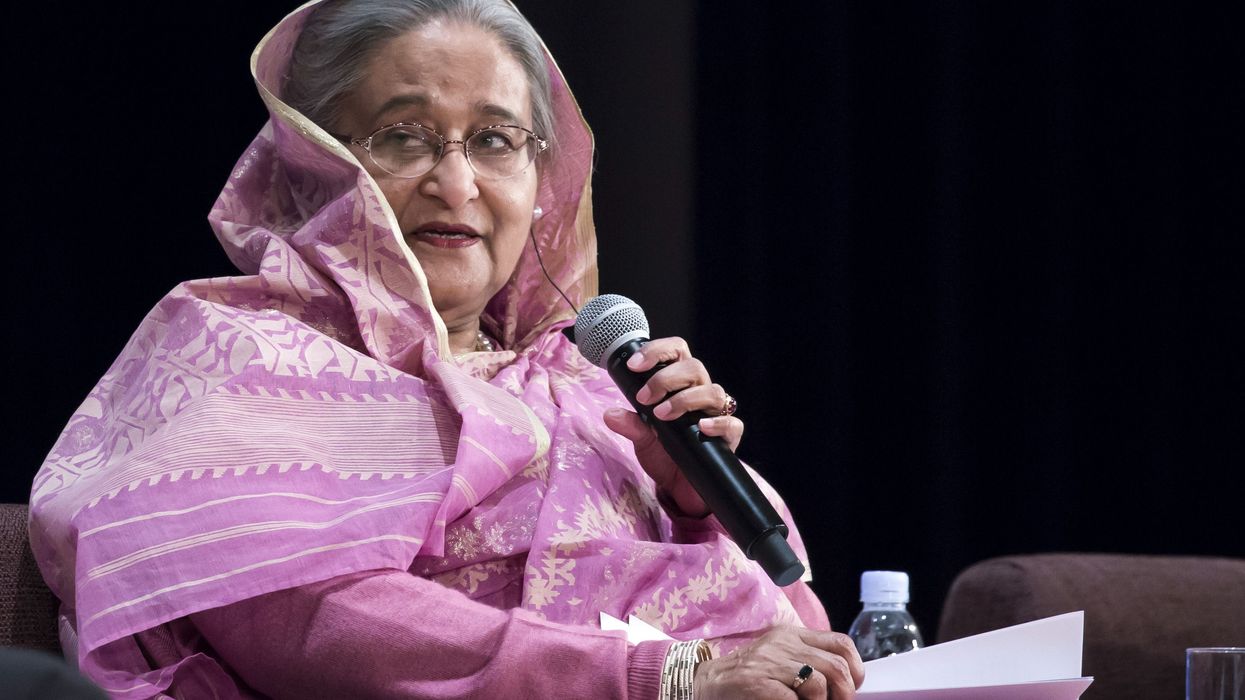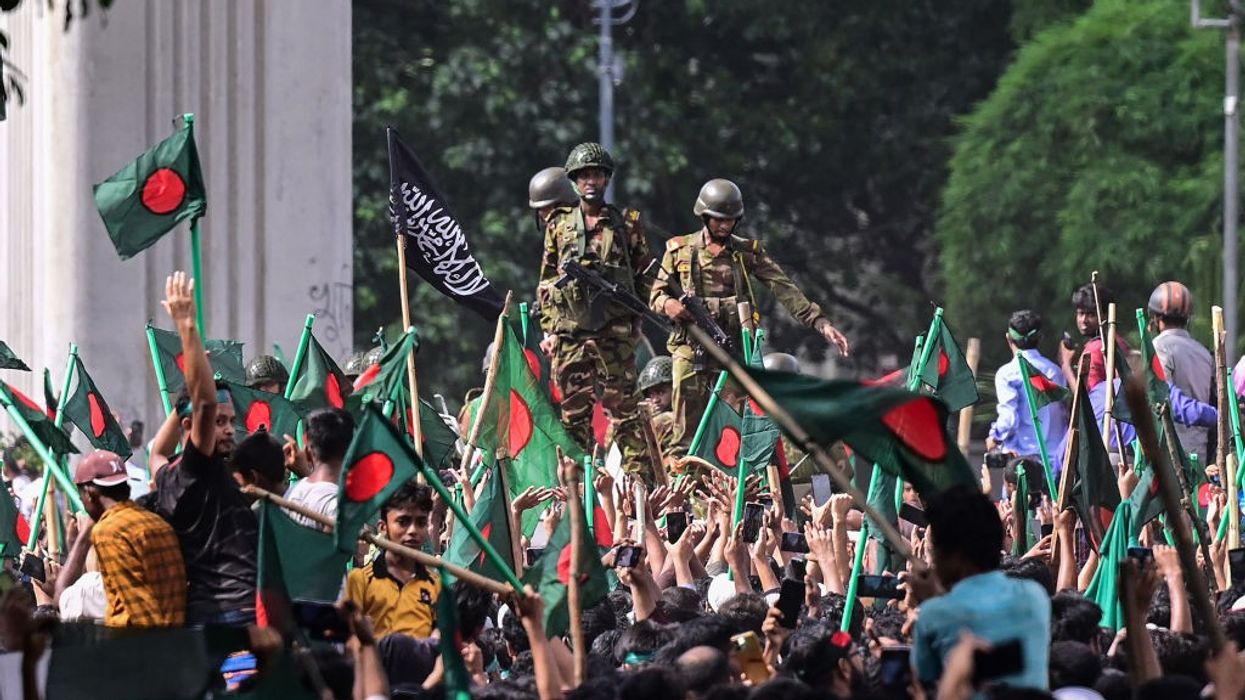Ex-Bangladeshi PM Sentenced to Death Over Deadly Student Protest Crackdown
Human rights defenders voiced concerns over the fairness of the in-absentia trial and death sentences for Sheikh Hasina and her former home minister.
Human rights groups and capital punishment abolitionists expressed alarm Monday after exiled former Bangladeshi Prime Minister Sheikh Hasina and her home minister were sentenced to death by a special tribunal for crimes against humanity for ordering last year's crackdown on student protests that left thousands of people dead and wounded.
Amnesty International secretary general Agnès Callamard asserted in a statement that "this trial and sentence is neither fair nor just."
"Victims need justice and accountability, yet the death penalty simply compounds human rights violations," she said. "It’s the ultimate cruel, degrading, and inhuman punishment and has no place in any justice process."
According to Callamard:
Justice for survivors and victims demands that fiercely independent and impartial proceedings, which meet international human rights standards are conducted. Instead, this trial has been conducted before a court that Amnesty International has long criticized for its lack of independence and history of unfair proceedings. Further, the unprecedented speed of this trial in absentia and verdict raises significant fair trial concerns for a case of this scale and complexity. Although Sheikh Hasina was represented by a court-appointed lawyer, the time to prepare a defense was manifestly inadequate. Such unfair trial indicators are compounded by reports that defense cross examination of evidence deemed to be contradictory was not allowed.
The International Crimes Tribunal (ICT) sentenced Hasina and former Home Minister Asaduzzaman Khan Kamal to death by hanging over their command responsibility for the killings, torture, and the use of lethal force against participants in what became known as the July Uprising.
Former Inspector General of Police Chowdhury Abdullah Al-Mamun was sentenced to five years in prison after he confessed his guilt and turned government witness against Hasina and Khan, both of whom fled to India in August 2024.
Ironically, the ICT was established by Hasina's Awami League government to prosecute the perpetrators of crimes against humanity and war crimes committed during the 1971 US-backed genocide committed by Pakistani forces in their unsuccessful bid to prevent what was then East Pakistan from becoming the independent nation of Bangladesh.
Last year's protests began as opposition to job quota reforms but escalated into a nationwide uprising against government corruption and human rights violations. The demonstrations forced Hasina—who had led Bangladesh for 15 years—to resign and flee the country on August 5, 2024.
According to the United Nations Office for the High Commissioner of Human Rights (OHCHR), members of Hasina's government and ruling Awami League "systematically engaged in a range of serious human rights violations" during the uprising.
"As many as 1,400 people may have been killed between July 15 and August 5, and thousands were injured, the vast majority of whom were shot by Bangladesh’s security forces," OHCHR found. "Of these, the report indicates that as many as 12-13% of those killed were children. Bangladesh Police reported that 44 of its officers were killed."
According to the ICT's 453-page judgment, Hasina told Sheikh Fazle Noor Taposh, then mayor of Dhaka South, that “police have been ordered to shoot protestors anywhere they can."
The ICT also found that Hasina incited violence with statements including asking if “Razakars’ grandchildren [will] get jobs rather than the grandchildren of the freedom fighters?”
Razakars were paramilitary fighters—mostly pro-Pakistan Bengalis and Biharis—armed and trained by Pakistan who committed some of the worst atrocities of the 1971 genocide. The "freedom fighters" to whom Hasina referred included members of the Awami League, which led the fight for Bangladeshi independence from Pakistan.
Hasina is the daughter of Awami League co-founder Sheikh Mujibur Rahman, who is considered the "Father of the Nation" for leading the struggle culminating in the 1971 genocide, Indian invasion, and, ultimately, independence for Bangladesh. He was assassinated along with numerous relatives and staff in 1975.
Hasina condemned the verdict and sentence as "biased and politically motivated."
"We lost control of the situation, but to characterize what happened as a premeditated assault on citizens is simply to misread the facts," she said in a statement, adding that "I am not afraid to face my accusers in a proper tribunal where evidence can be weighed and tested fairly."
Both Hasina and ousted and imprisoned former Pakistani Prime Minister Imran Khan have accused the United States of conducting covert operations to topple their respective governments. Former Bangladeshi ministers allege that the US Agency for International Development and the Central Intelligence Agency—both of which have long histories of subversion, torture, and regime change operations—had hands in the July Uprising. The Biden administration denied any involvement in ousting Hasina.
The condemned defendants may now appeal to the Supreme Court.
Muhammad Yunus, the Nobel Peace laureate who leads Bangladesh's interim government ahead of parliamentary elections expected to be held next February, called the verdicts and death sentences "important, though limited, justice."
"Today, the courts of Bangladesh have spoken with a clarity that resonates across the nation and beyond," he said. "The conviction and sentencing affirm a fundamental principle: no one, regardless of power, is above the law."
UN Human Rights Spokesperson Ravina Shamdasani called the verdicts "an important moment for victims of the grave violations committed during the suppression of protests last year."
However, Shamdasani added that "we also regret the imposition of the death penalty, which we oppose in all circumstances."
Human Rights Watch deputy Asia director Meenakshi Ganguly wrote on X that "Bangladesh should ensure a credible justice system" and "abolish capital punishment."
India's Ministry of External Affairs declined to say whether it would honor Bangladesh's request to extradite Hasina and Khan.
"As a close neighbor, India remains committed to the best interests of people of Bangladesh, including in peace, democracy, inclusion, and stability in that country," the ministry ambiguously stated. "We will always engage constructively with all stakeholders to that end."
Experts say extradition is highly unlikely.
The days leading up to the verdicts saw widespread protests and unrest, including dozens of arson and crude bomb attacks resulting in the deaths of two people.


